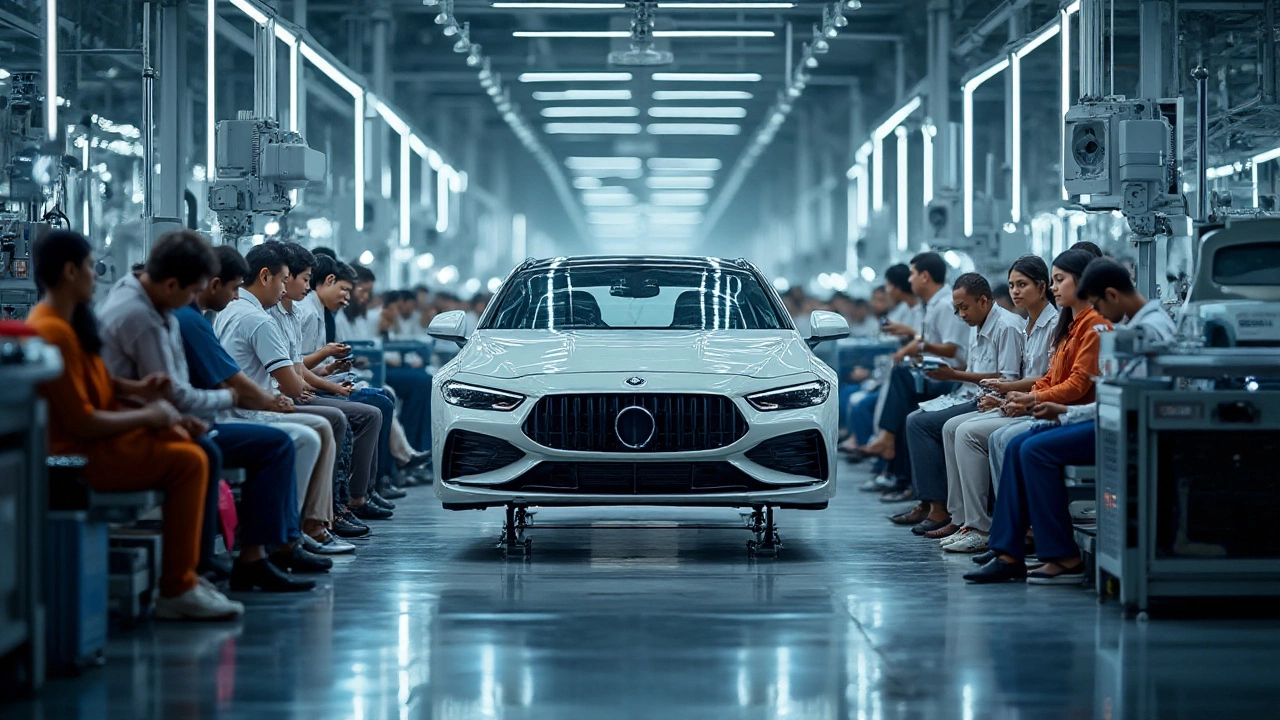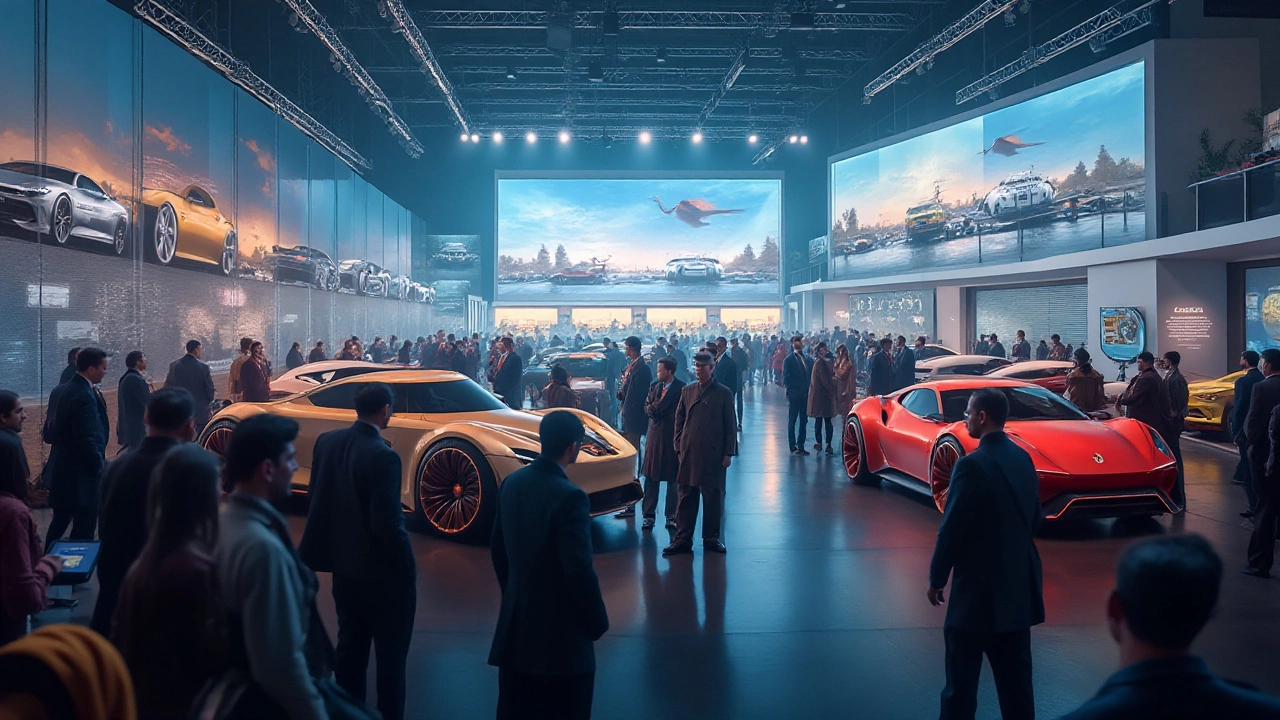India's automobile industry stands as one of the largest in the world, characterized by a mix of high volume and diverse vehicle production. The country is not just a hub for manufacturing but also a dynamic market welcoming automotive innovations. Over the decades, India has experienced a transformation in the way vehicles are designed, manufactured, and consumed.
With new technologies emerging every day, Indian automobile manufacturers are at the forefront of delivering cutting-edge solutions tailored to local preferences. This transformation stems from a strong economic foundation augmented by consumer aspiration and technological advancement. The Indian market is a playing field for both domestic and international automakers, each vying to capture the hearts of millions.
Today, we're taking a close look at the automotive landscape in India, focusing on companies that are driving the industry forward. From stalwarts that have stood the test of time to new-age players bringing fresh perspectives, discover the leaders shaping India's roads in the years to come.
- Indian Automotive Market Overview
- Key Players in the Industry
- Innovation and Technology in Indian Automobiles
- Future Trends and Developments
Indian Automotive Market Overview
The Indian automotive market has blossomed into a major global player, growing at an impressive rate over the past few decades. Spurred by a burgeoning middle class and a surge in disposable income, India's automotive industry now ranks as one of the largest globally. This sector caters not only to domestic needs but has also become a pivotal point for export. With more than 26 million vehicles produced yearly, India is creating a benchmark for innovation and manufacturing prowess.
The unique charm of India's automotive sector lies in its diversity. From compact cars to commercial vehicles, it spans a wide range that caters to various consumer segments. This variety can be attributed to the changing needs and preferences of Indian consumers, who have been drawn to the affordability and functionality of vehicles produced within the country. In particular, the Indian auto market has embraced a shift towards eco-friendly cars, aligning with global sustainability trends. This move has seen a steady rise in electric vehicles, a segment that's undergoing rapid development to cater to environmentally conscious customers.
The industry has not only focused on scalability but also on technology, investing heavily in research to enhance driver safety and convenience. Automakers in India have adopted digital transformation, embracing artificial intelligence, machine learning, and data analytics to personalize customer experiences. One industry insider aptly remarked,
"India's automotive industry is not just about making cars; it's about creating tomorrow's mobility solutions."Such sentiments highlight the country's commitment to evolving with the times, incorporating the latest technologies to facilitate an efficient transportation ecosystem.
Moreover, collaborations between Indian players and global giants have sparked an exchange of expertise and resources, strengthening the position of Indian companies on the world stage. The growing interest of international brands in setting up manufacturing units in India is a testament to the market's strategic importance. This not only contributes to job creation but also bolsters the economy. With its vast potential, India's automotive sector is poised for extensive growth in the coming years, supported by favorable government policies that include initiatives like the "Make in India" campaign.
An emerging trend in the Indian auto market is the adoption of digital platforms for vehicle sales. Consumers now have the flexibility of purchasing vehicles online, a convenience further accelerated by the pandemic. This seamless shift has given rise to virtual showrooms, which offer a comprehensive buying experience from the comfort of one's home. Meanwhile, car manufacturers are investing in augmented and virtual reality technologies to enrich consumer engagement and provide detailed insights into their product offerings.
Statistical data underscores this dynamic market's vitality. A significant portion of the workforce is employed by the automobile sector, contributing to a substantial percentage of the country's GDP. A report by the Society of Indian Automobile Manufacturers (SIAM) indicates that the industry contributes nearly 7.1% to India's GDP and constitutes about 49% of its manufacturing GDP. Forecasts suggest continued robust growth, powered by a rise in personal mobility, regulatory backing, and technological advancements. The Indian automotive industry is set to continue its journey as it accelerates into a future marked by innovation and opportunity.

Key Players in the Industry
The Indian automobile industry is bustling with activity, spearheaded by a few major companies that have consistently set benchmarks in manufacturing, sales, and innovation. One cannot discuss the Indian auto market without mentioning Maruti Suzuki. As a household name, Maruti Suzuki dominates the Indian roads with its fuel-efficient and economical models. Known for producing vehicles that cater to the middle-class segment, they have become synonymous with reliability and affordability. From the classics like the Maruti 800 to its latest models, the brand has maintained a significant edge over competitors. A key highlight has been its aggressive production capacities and focus on consumer needs, manifesting in high market shares year after year.
Hyundai Motors India, a global heavyweight, stands as a notable competitor, consistently challenging the status quo with their blend of style and technology. Their strategy involves bringing the latest international designs to the Indian audience, often setting trends that others follow. With popular models such as the Hyundai Creta and Venue, the brand has tapped into the urban youth's aspirations. Hyundai's commitment to innovation is evident in its foray into electric vehicles, a move that indicates a substantial shift towards sustainability and advanced technology.
Another significant contributor is Tata Motors. With its roots deeply embedded in India, Tata Motors has gradually transitioned from producing heavy commercial vehicles to an array of passenger cars. Known for their robust build quality, Tata vehicles are often seen as safe, reliable companions for the Indian roads. The Indica and now the Nexon have resonated with different consumer bases, appealing to a sense of national pride while incorporating high safety standards. Ratan Tata's vision for Tata Motors has always embraced change and innovation, highlighting the brand's adaptability over the years.
In the words of an industry expert, "Tata Motors' journey is not just about building cars but building trust with the Indian consumer."
Mahindra & Mahindra, another stalwart, cannot be overlooked. Historically known for their sturdy SUVs and tractors, Mahindra has made strides in the electric vehicle segment and even touched international markets with acquisitions and joint ventures. Their legacy with cult models like the Mahindra Scorpio and Thar demonstrates their mastery over rugged, off-road vehicles. The company’s recent launches underscore a blend of modern aesthetics and traditional toughness.
Additionally, Honda Cars India brings its global reputation for quality engineering to the market. With an impressive range from sedans to SUVs, Honda targets the premium segment, striving to deliver a luxury experience backed by performance. Their commitment is visible in the market reception of models like the City and the Jazz, both celebrated for advanced technology and fuel efficiency.

Innovation and Technology in Indian Automobiles
Innovation has taken the driving seat in the Indian automotive industry, steering the sector toward a future defined by efficiency, sustainability, and connectivity. The Indian auto market is witnessing a fascinating phase where traditional engineering meets digital ingenuity. Several automakers are investing heavily in research and development to craft vehicles that cater to new-age consumers while meeting stringent regulatory standards.
The advent of electric vehicles (EVs) marks a significant shift in the paradigm. More companies are now launching EVs, taking advantage of government incentives and growing consumer awareness. For instance, homegrown companies like Tata Motors and Mahindra have launched affordable EVs, catering to the environmentally-conscious urban population. This wave of change signifies ambitions aligned with global efforts to curb emissions and promote sustainable urban mobility.
Connectivity is another frontier being explored extensively. Modern vehicles are increasingly integrated with technology, offering features such as AI-driven navigation systems, real-time diagnostics, and enhanced safety mechanisms. These technologies serve as midpoints for consumers and manufacturers alike, allowing seamless rapport via mobile applications that provide updates on car health and performance. A quote from an industry leader went viral last year, stating, "The future of automotive lies not in horsepower but in software," signifying the change in core ideologies driving this revolution.
Manufacturers are not only focused on the future but also on optimizing existing technologies. Hybrid vehicles have found a niche market in India, blending conventional engines with electric motors to achieve higher mileage and lower emissions. Brands are experimenting with biofuels and hydrogen-powered cars, though their presence is not yet widespread. These efforts illustrate a commitment to minimizing ecological footprints while offering alternatives for traditional fuel.
Digital Transformation in Automotive Manufacturing
The automotive sector is a laboratory for innovation beyond just vehicles. Behind the scenes, digital transformation is reshaping manufacturing processes as well. Techniques such as 3D printing and robotics are becoming pivotal, allowing for precision, efficiency, and reduced cost in production lines. Automated systems are managed by sophisticated software, ensuring consistency and quality assurance at every stage of manufacturing. Not only does this cut down on human errors, but it also pushes the boundaries of what's possible in automobile design and engineering.
As we navigate the twists and turns of innovation, the India automotive industry ensures it remains agile and adaptive. Collaborations with technology behemoths and startups are common, resulting in a cross-pollination of ideas that benefits the end consumer. With these strides, India is not just following global automotive trends; it is a crucial player contributing to the global momentum driving automotive innovation.

Future Trends and Developments
As we steer into 2025, the Indian automotive industry is undeniably on the cusp of several transformative changes. Not just here, but globally, the buzz around electric vehicles (EVs) continues to gain remarkable traction. In India, this shift is being fueled by a mix of governmental policies aimed at promoting sustainability, the burgeoning demand for eco-friendly alternatives, and technological advancements that make electric vehicles more appealing and affordable. Today, Indian and global companies are racing to dominate this segment, rolling out EV models that cater to the diverse needs of the Indian consumer, from affordable electric two-wheelers to luxury electric SUVs.
Another noteworthy trend is the integration of advanced technology into vehicles. The drive towards autonomous and fully connected cars is not a futuristic dream but a reality that is slowly taking shape. Companies are investing heavily in research and development to enhance features such as driver-assist systems, smart connectivity, and Internet of Things (IoT) capabilities. Imagine cars that communicate with traffic systems to ease congestion, or vehicles that can diagnose their own issues and schedule service appointments automatically. These innovations promise to redefine the driving experience, providing greater convenience, safety, and efficiency.
With urbanization on the rise, there is a growing focus on smart city solutions which include intelligent transport systems. Here, shared mobility is gaining prominence. Ride-sharing apps and carpooling services are bridging gaps in public transportation, offering economical and eco-friendly commuting solutions. While personal vehicle ownership remains aspirational for many, shared mobility introduces a shift in perspective, encouraging a sustainable model for future transport. In an exclusive interview, Anjali Srivastav, a leading analyst in the Indian auto market, noted,
"The growth in shared mobility reflects a more conscious choice among urban consumers, who are looking for flexibility and cost-efficiency while being mindful of environmental impact."
The push towards sustainable practices is also evident in the manufacturing processes themselves. Many leading India automotive industry players are committed to reducing their carbon footprint by adopting green manufacturing practices. From sustainable sourcing of materials to energy-efficient production lines and the use of renewable energy, automakers are aiming to make production as environmentally friendly as the product itself. These developments position India as a leader in automotive sustainability, setting a benchmark for others to follow. Additionally, partnerships with global technology firms are enhancing India's capacity for cutting-edge automotive solutions. This collaborative approach is beneficial as it facilitates the exchange of technical expertise and innovation that is crucial for the industry's growth.
A useful way to understand these emerging trends in numbers is through a few insightful statistics. Here, we take a look at some key metrics that underline the trajectory of Indian automotive growth in the near future:
| Aspect | Projection by 2025 |
|---|---|
| Electric Vehicle Market Share | 10% |
| Connected Vehicles | 70% of new vehicles |
| Reduction in Manufacturing Emissions | 30% |
| Increase in Shared Mobility Users | 50% growth annually |
In wrapping up this insight into future trends, it's clear that India's automotive landscape is embracing a fundamental shift. Driven by evolving consumer preferences, technological advancements, and a conscious push towards sustainability, the changes point toward an era of thoughtful innovation. Keep your eyes peeled, for the journey promises to be as exciting as the destination.
